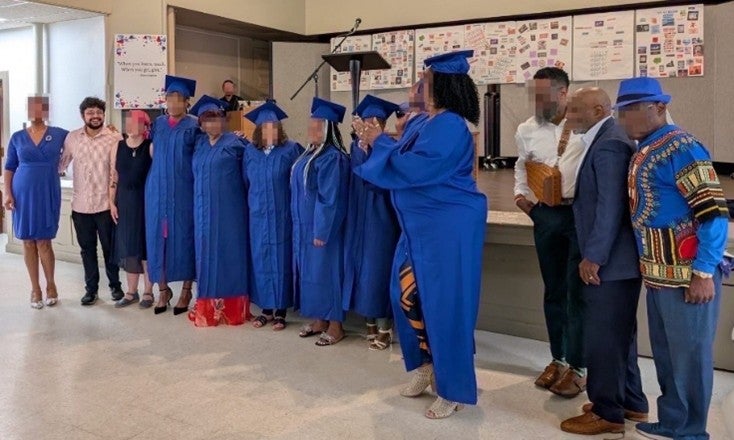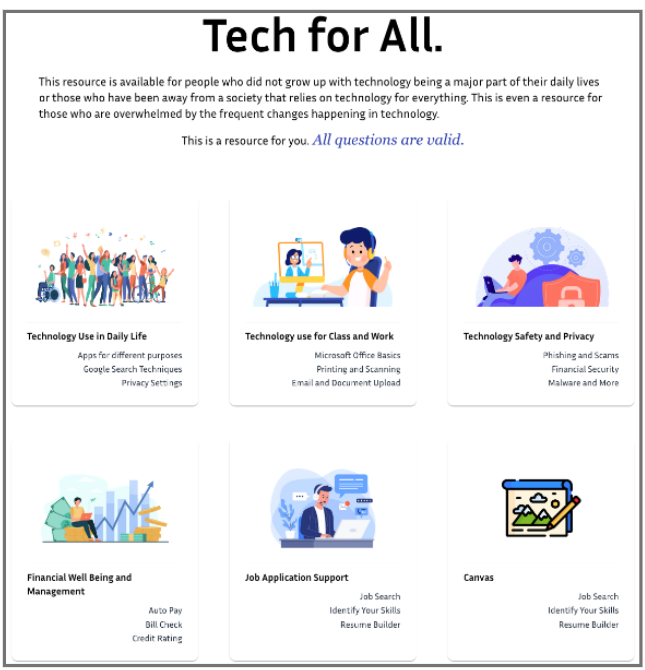October 1, 2025
 The Colorful Backgrounds EXPO, a 12-week reentry program led by Pittsburgh nonprofit West End P.O.W.E.R. and the Pennsylvania Interfaith Impact Network (PIIN), recently partnered with School of Computing and Information (SCI) assistant professor Aakash Gautam to provide digital literacy training and future envisioning tools that support returning citizens as they reenter their communities.
The Colorful Backgrounds EXPO, a 12-week reentry program led by Pittsburgh nonprofit West End P.O.W.E.R. and the Pennsylvania Interfaith Impact Network (PIIN), recently partnered with School of Computing and Information (SCI) assistant professor Aakash Gautam to provide digital literacy training and future envisioning tools that support returning citizens as they reenter their communities.
West End P.O.W.E.R. is a nonprofit organization that supports previously incarcerated citizens, individuals recovering from substance use disorders, and other returning community members in making a smooth transition back into society. Their mission is to provide multi-modal tools and resources that target most common areas of concern for previously incarcerated individuals that prepare them to successfully restart their careers: job readiness (including resume writing and mock interviews), digital literacy, community organizing, leadership skills, anger management, financial literacy, and an expungement clinic.
The Socio-Technical Systems in an Interdependent World (STIW) Lab, directed by Assistant Professor Aakash Gautam, collaborated in this effort. Memberse of the STIW lab conduct community-based design research, which includes co-developing technologies that center on the lived experiences of returning citizens to use images, icons, text, and other creative digital tools to plan their futures, create a visual manifestation of their goals, and support returning citizens to adapt over time.
“We explicitly talk about how goals keep changing… so we take the physical vision board, which is the first exploration, and then move it to a digital tool that allows people to design it entirely, update it, and connect it with other resources,” said Aakash, who is a faculty member with SCI's Department of Computer Science and Department of Informatics and Networked Systems.
 This collaboration also addresses a crucial skill for successful reentry: digital literacy. Having digital literacy as a returning citizen is critical because so much of everyday life now depends on it: from submitting online job applications and tailoring resumes to searching for stable housing and finding healthcare or childcare support. For example, knowing how to find online platforms that list employers who do not discriminate against applicants with prior records can make all the difference in starting a new career. As Gautam explains, “nobody wants to use a computer just to use a computer – you want to use it to get to the things that matter.”
This collaboration also addresses a crucial skill for successful reentry: digital literacy. Having digital literacy as a returning citizen is critical because so much of everyday life now depends on it: from submitting online job applications and tailoring resumes to searching for stable housing and finding healthcare or childcare support. For example, knowing how to find online platforms that list employers who do not discriminate against applicants with prior records can make all the difference in starting a new career. As Gautam explains, “nobody wants to use a computer just to use a computer – you want to use it to get to the things that matter.”
Through a partnership with Findhelp, the research team has integrated local and national social service listings directly into the tool, helping participants reach essential services, resources, and organizations that support workforce development and community reintegration.
By having the University of Pittsburgh support these efforts, the message of reentry and second chances is extended to a larger community, helping to reduce stigma and further support the mission from many different angles. This also reflects the Plan for Pitt's vision of advancing community strength through engaged scholarship and partnerships that create real impact beyond campus. These efforts show how academic expertise and community knowledge can build pathways toward equity and shared prosperity.
Another critical part of the program, extending well beyond the 12 weeks of enrollment, is fostering a lasting sense of community. This ongoing support allows participants to “find helpful role models that help them get to the successful future that they had envisioned,” said Aakash. As a mentor and partner in the program, Aakash described attending the Colorful Backgrounds EXPO graduation as a powerful moment with families, friends, and alumni all in attendance together. It showed how the program creates lasting relationships that grow and strengthen our Pittsburgh community.
"We are only as strong as the most disadvantaged members of our community," noted Aakash. "When students use their computing knowledge to build capacity in their neighborhoods with the communities they care about, that's powerful. It's the purpose of education."
For SCI students, these programs offer opportunities to apply computing skills in ways that create social impact and attend to complex real-world challenges. Students can connect with Aakash and fellow student researchers in the STIW Lab to contribute to projects like the future envisioning tool and digital literacy initiative.
In addition, the Petey Greene Program, another Pitt partner, offers students the chance to volunteer directly as academic tutors for justice-involved youth and formerly incarcerated individuals. Its mission is to ensure educational justice for all members of the community, grounded in the belief that education is a resource that should be accessible to everyone. Learn more about becoming a volunteer.
“We are only as strong as the most disadvantaged members of our community,” explains Gautam. Through partnerships like these, SCI students and faculty can see how their unique skills can be applied in ways that strengthen their local communities.
Learn more about West End P.O.W.E.R and the Colorful Backgrounds EXPO. Thank you to Aakash Gautam and University of Pittsburgh’s STIW lab for sharing their work!
